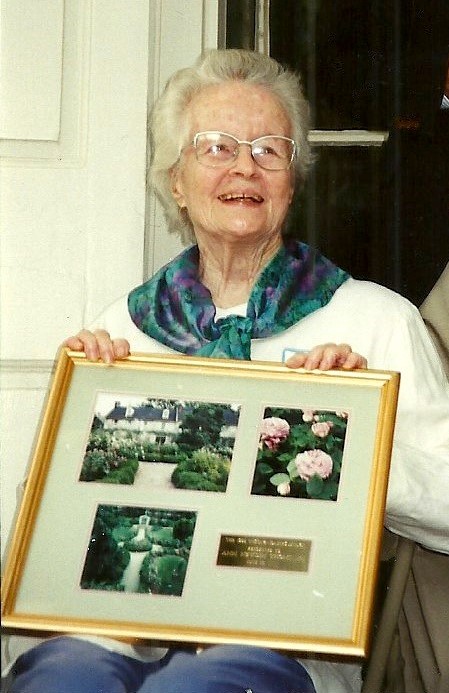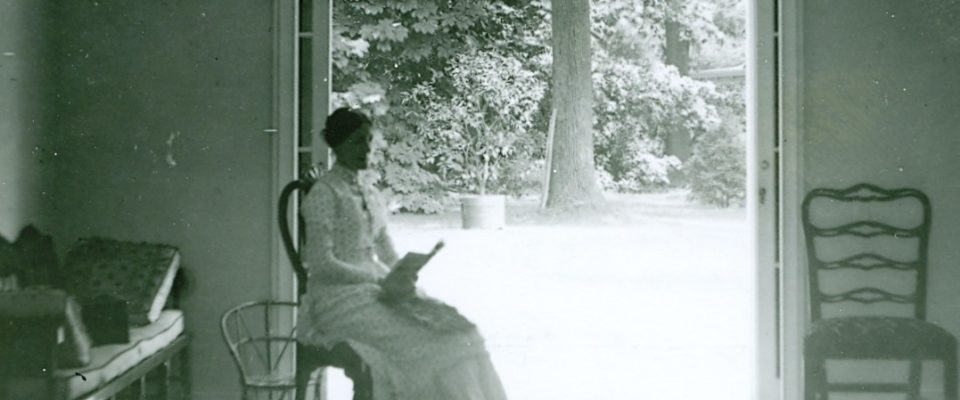Planned Giving
The family members who lived at Wyck balanced tradition and innovation in every aspect of their lives. Quaker values and aesthetics are evidenced in the house and garden as well as in the family’s legacy as philanthropists, innovators, educators, applied horticulturists, and social reformers. The greatest legacy of Wyck, however, is this family’s enduring commitment to preserving Wyck and its history for future generations. Today, we honor this family’s vision and their commitment to preserving and sharing Wyck with the 1690 Society.
The 1690 Society recognizes visionaries who have made provisions for the Wyck Association through their estate and financial planning. Please consider joining the 1690 Society and ensure that Wyck will be preserved and enjoyed for generations to come.
Planned gifts can take a variety of forms based on your financial and philanthropic goals, including bequests, charitable gift annuity, retirement plan, life insurance policy, other types of charitable giving arrangements. The Wyck Association can assist you in becoming a 1690 Society member and answer your questions about estate planning. Please contact the Executive Director, Kim Staub, at 215.848.1690 or kstaub@wyck.org.

You may also talk with a planned giving professional at Friends Fiduciary by calling 215-241-7272; or visit www.friendsfiduciary.org. If you have already named the Wyck Association as a beneficiary of your estate, you are eligible for membership in the 1690 Society and simply need to notify us of your gift. Only you and your advisors will be able to determine how a charitable gift fits into your financial and estate plans. As with any decision regarding legal and financial matters, we encourage you to consult with your own independent professionals before making your decision. We thank you for considering planned giving.
Wyck 1690 Society Members
- Emily Lind Baker
- Laura Haines Belman
- Ingrid E. Bogel
- Daniel K. Butler*
- Marigene H. Butler*
- William Bacon Carey, M.D.*
- Daniel Wills Collins*
- Mary T. Haines*
- Elizabeth C. Hock Charitable Remainder Unitrust*
- Sarah Latimer
- The E. Irene Reymann Trust*
- John M. Roberts, M.D.*
- The Reverend Douglas T. Seidel*
- Mary Strawbridge Shipley*
- Paul Emlen Shipley*
- Marianna Stutzman*
- Mary N. Taylor*
- Ann Newlin Thompson*
- Raquel Wistar*
* Deceased
Every effort has been made to include all known 1690 Society member names. In the event of an omission or error, please notify us and accept our sincere apology.
Society Stories
William Bacon Carey, M.D.
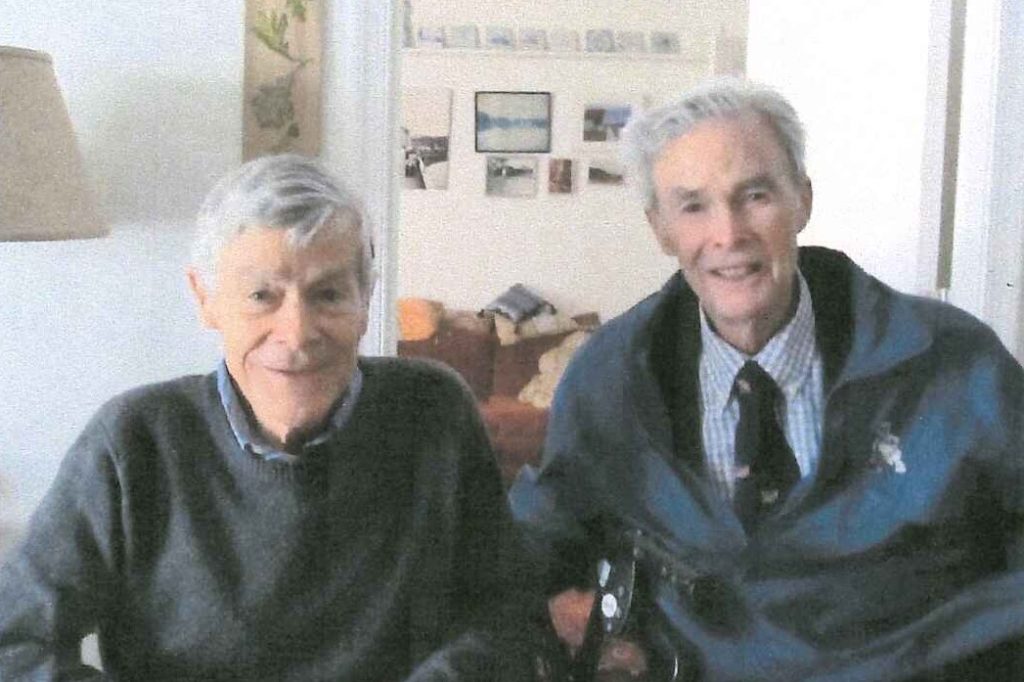
Bill Carey, a Director of the Wyck Association since the 1980s and President of the “Friends of Wyck,” has been one of institution’s longest and most loyal supporters. A direct family descendant, he attended Germantown Friends School through the third grade, graduated from Milton Academy near Boston, Yale College (American Studies major), and the Harvard Medical School. As a prominent pediatrician, who was mainly in primary care practice in Media, he authored or edited numerous books and professional papers, has had a lengthy association with the Children’s Hospital of Philadelphia since 1960, and has distinguished himself as a medical teacher and researcher about children’s development and behavior particularly about the nature and clinical importance of their temperament differences. In 1984 he was elected to the Institute of Medicine, now known as the National Academy of Medicine.
Bill’s ancestor, Hannah Haines of Wyck, married William Henry Bacon in 1843. Their son, William Warder Bacon, was Bill’s grandfather. The multi-generational relationship is illustrated in the photo (at right) showing Bill’s mother, Margaret, her father WWB, and her grandmother Hannah Haines Bacon.
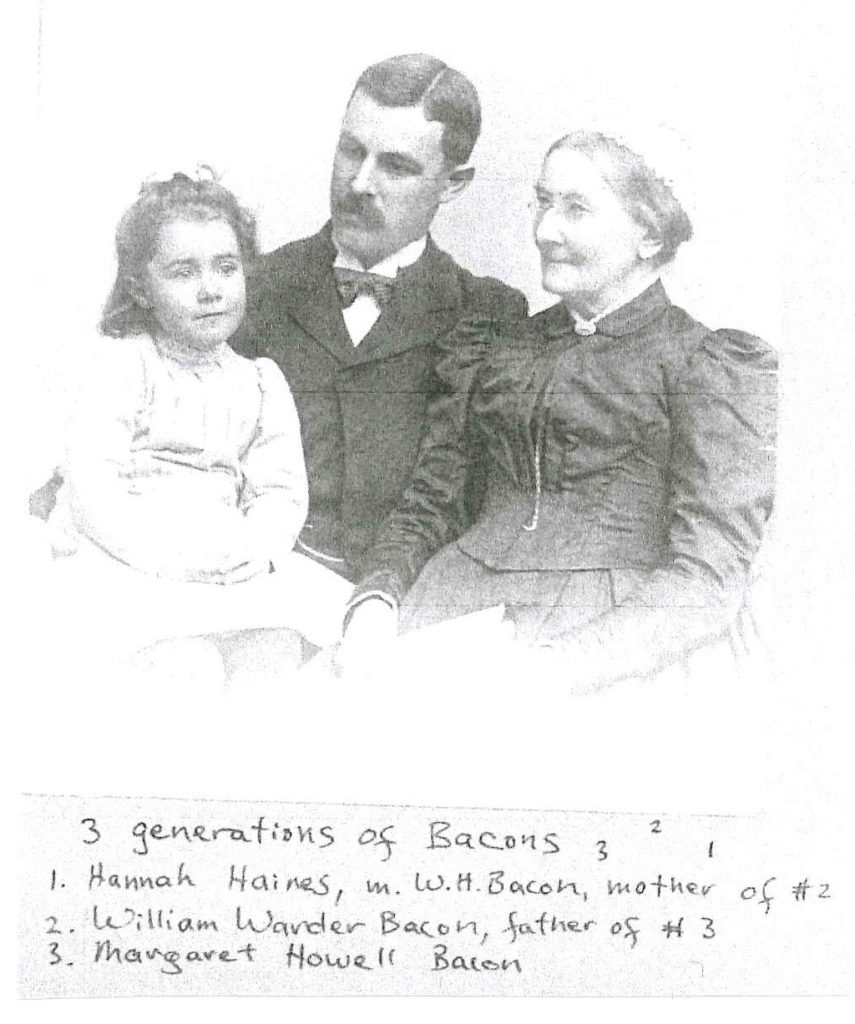
One of Bill’s special skills is relating family stories about the activities people who either resided at Wyck or visited there. For example, there are varying reports and some spirited discussion about where the Marquis de Lafayette on his triumphant return to America in 1825 may have sat. That controversy can easily be resolved by noting that he was an old man and it was a long, hot day and that he undoubtedly sat down more than once. One of those possible resting places was on the Empire sofa, now in the parlor. In 1911 it was given out to Bill’s grandfather, next his mother, and eventually to the present generation. It stood in his house in Swarthmore for many years until the 1980s he and his brother John decided it was time for it to return to Wyck. He has made sure that a number of other items, such as books, clothes, and practical household items, which had been graciously given out from the family house were returned to the house museum.
Another story came from Charles Haines about how the “Cousins Party” came to be called by that name because strictest Quaker orthodoxy thought it inappropriate to celebrate a pagan holiday such as New Year’s Day. Some relative’s birthday came just after New Year’s Day, so that served as the justification for the merriment. That was easily changed to the “Friends of Wyck” New Year’s party in the early 1970s and continues as a regular annual event although nobody can remember whose birthday it was. Bill has remembered Wyck in his will as a way of supporting family tradition in future years.
Bill passed away July 26, 2020.
Laura Haines Belman
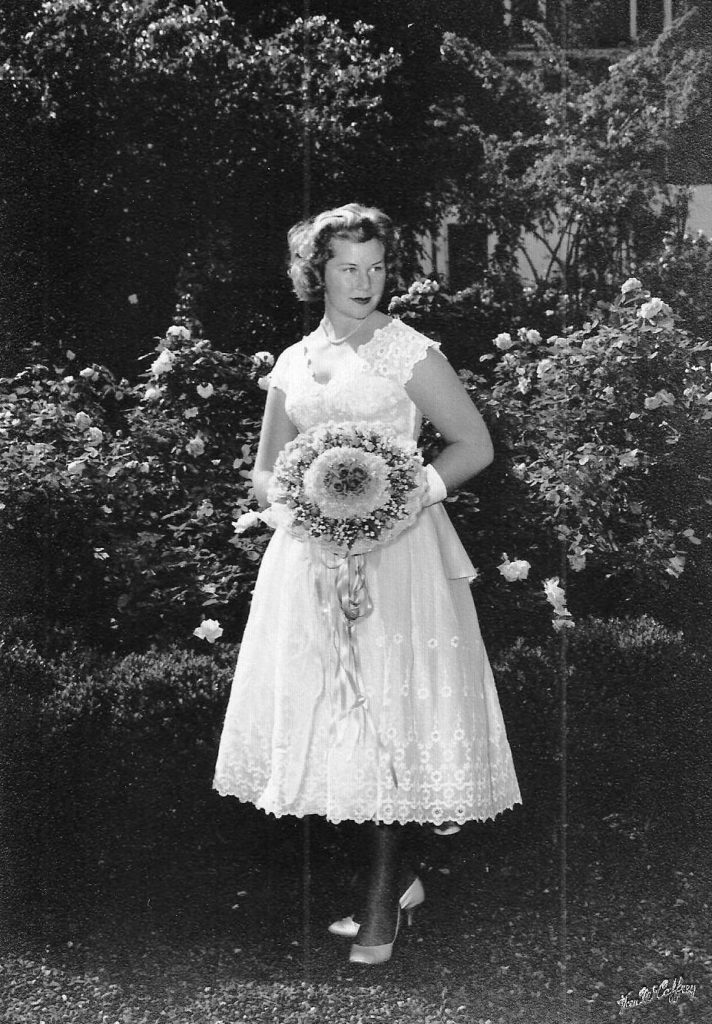
Although I grew up in California and my Wyck grandfather, Diedrich Jansen Haines, had died when I was four, my parents would bring my brother and me to Philadelphia to visit the family. My widowed grandmother, Ella Wistar Haines, was devoted to Cousins Mary and Bob Haines, the last owners of Wyck. Out we would go to Germantown. “Ganny” never missed a Cousins’ Tea.
When I moved east for college, my grandmother, Cousins Mary and Bob, and my Uncle Caspar Wistar Haines gave me a tea party at Wyck. It was in June of 1958 and featured Raspberry Shrub. My Philadelphia Inquirer photograph was labeled “Bud Bows Amid Roses.” After I married in Washington, D.C., I continued visiting. Between 1969 and 1979, with advice from Cousin Mary, I stitched the crewel genealogy that hangs in the Conservatory today.
In the fall of 1989, Cousin Charles Haines invited me onto the Wyck Board of Directors. At some point thereafter, he urged me to put Wyck in my will. He and Cousin Margery, my parents and grandparents, are all gone, but Wyck lives on, and I want it to be there for future generations. It gives me great satisfaction to know that, in a small way, I can help keep Wyck going beyond my lifetime. — Laura Haines Belman
Ingrid E. Bogel
Ingrid E. Bogel first became engaged with Wyck through her position at the Philadelphia Museum of Art, where she worked with Marigene H. Butler, Head of the Conservation Department. Wyck was planning to hire its first Executive Director and Marigene asked Ingrid to provide administrative support and budgeting assistance for this process. Over time Ingrid became more and more engaged with Wyck’s growth, ultimately joining Wyck’s Board of Directors assisting in education, outreach, fundraising, and collections management.
Ingrid’s activities included early leadership of the first Wyck-Strickland Award, guiding this major organizational fund-raising event for many years. She has served on virtually all committees, eventually becoming Chair of the Association. Ingrid’s dedication has been recognized through the receipt of the Wister-Haines Award, an honor bestowed only on individuals who have actively sustained Wyck for an extensive period of time.
Because of her recognition of Wyck as a unique historical resource with unsurpassed collections, Ingrid believes it is important to create a legacy to perpetuate its collections, gardens, history, structures, and educational programs. By remembering Wyck in her estate plans, she is complementing her devotion to a site that has generated local, regional, and national recognition. Through her service as a preservation professional to many non-profit groups, she realizes the importance of making unrestricted gifts that can be adapted to changing times and conditions.
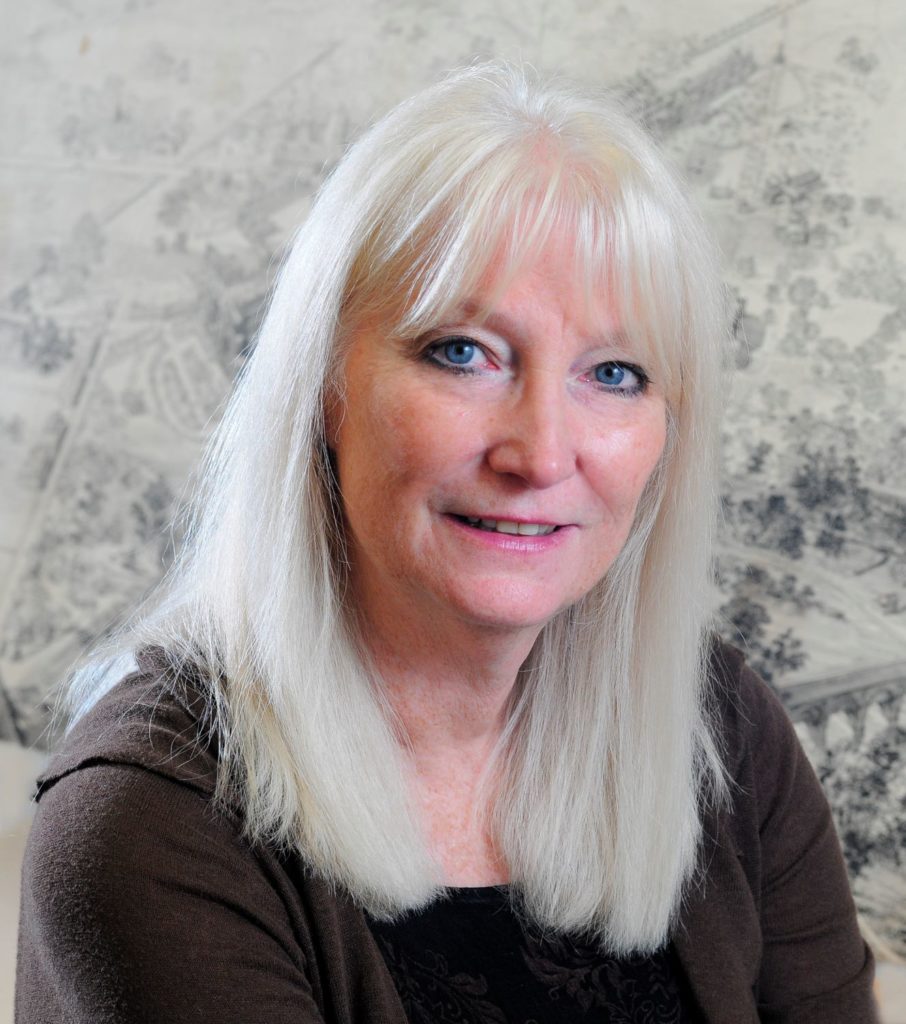
Marigene and Dan Butler
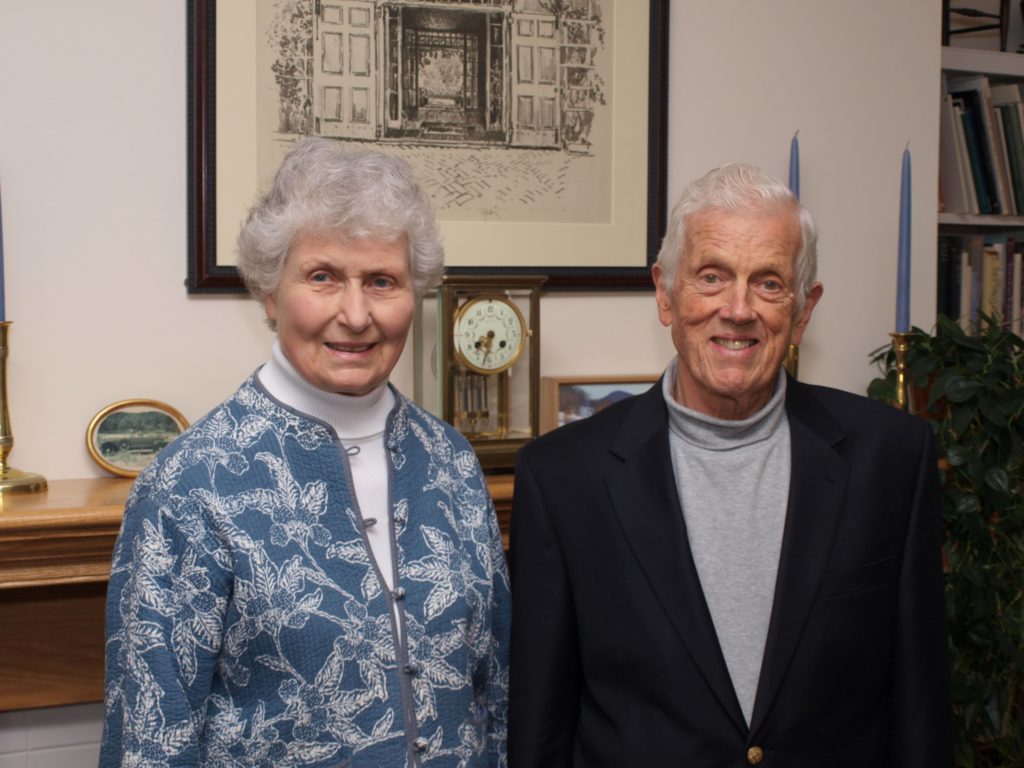
Soon after Marigene and Dan Butler moved to Philadelphia from the Midwest in 1978, some of their Mount Airy neighbors hosted a large dinner party for friends who also had college age children. Nancy and Don Rhoads, descendants of the Wistar-Haines family of Wyck, were among the attendees. Later, when the young people were home from college for the Christmas holidays, the Butlers invited the Rhoads for dinner and the families learned more about each others’ interests and expertise. When Nancy, one of the earliest leaders of Wyck, discovered that Marigene was Head of Conservation at the Philadelphia Museum of Art, she invited her to tour the house and gardens and later, to join the Board of Wyck. The Butlers’ involvement grew over the years as they learned more about the depth and richness of the collections and their importance to the social history of Philadelphia.
In 1988 Marigene was elected Chair of the Wyck Association Board of Directors. Subsequently she served as Vice-Chair for fifteen years, for a total, ultimately, of about thirty years on the Board. Dan’s skill at repairing virtually any household fixture, particularly useful in older buildings, soon became apparent and he, too, became a valued Board member, serving for twenty years. After decades of involvement with Wyck and its mission, joining the 1690 Society was a natural thing to do. Knowing that their financial support would be used to preserve the collections, both Marigene and Dan named the Wyck Association in their wills. They are confident that their funds will be wisely employed to strengthen this vibrant Philadelphia institution.
Dan Butler passed away peacefully in June 2013.
Ann Newlin Thompson
Ann Newlin Waring Thompson was widowed in 1946. As her children grew, she pursued horticulture and eventually took a position at Ernesta Drinker Ballard’s Greenhouse in Chestnut Hill where she specialized in houseplants (Ernesta would later become the Executive Director of the Pennsylvania Horticultural Society from 1963-1981, and was a graduate of Jane Bowne Haines II’s Pennsylvania School of Horticulture for Women). In 1980, after leaving Ernesta’s Greenhouse, Ann (also called Nan) would write her own gardening advice in pieces like “Green Habits: Plants Are Not Pieces of Furniture” (Green Scene, September1980) and the preface to “Germantown Green”, a 1982 publication.
Ann was an independent-minded Quaker horticulturist and an ardent admirer of her ancestors, Reuben and Jane Bowne Haines. She studied Jane’s garden notes intently while restoring Jane’s beloved rose garden. Chief challenges in the garden were pruning back overgrown boxwood bushes and removing noxious invasive vines from the rose garden beds. The latter required lifting every rose bush and temporarily heeling it into a weed-free bed, then returning the bush to Jane’s original design as documented in her 1820 garden diary when the bed was free of weeds.
In 1997, Ann donated the funds for Wyck’s horticultural endowment through the Philadelphia Foundation to insure continued support for Wyck’s garden maintenance and care.
When Ann passed away in 2000, a reception in her honor was held at Wyck- it meant a lot to her family and friends to be in the place she adored so much. Sandra Mackenzie Lloyd’s unpublished history of Wyck’s gardens includes reference to Nan’s work restoring the gardens of Wyck. Ann thought the garden’s restoration should not just become a replica of what it was in 1820, but a garden that “…constantly blends the old with the new, and. like any garden, it is a place that brings delight as it changes from season and from year to year.”
Wyck’s garden thanks you again and again, Ann Newlin Thompson.
